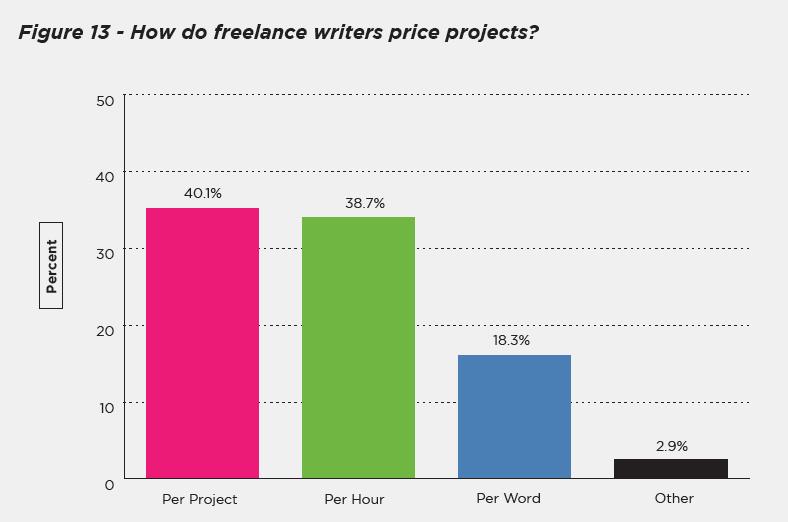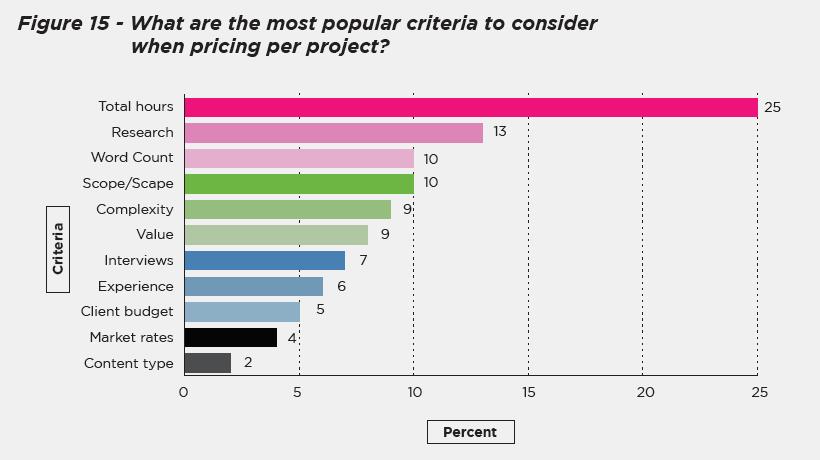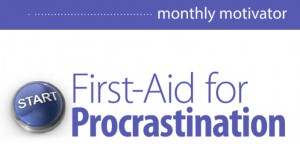This is a common question we get from freelance writers who are just starting out.
If you’re a beginner, it can be hard to determine exactly how much you should charge a potential client.
What factors should you take into account when deciding what to charge?
Are there standard fees for writing? How much do other writers charge?
All these questions – and more – need to be considered before you can put together a professional quote.
Let’s start from the top.
Determine Your Skill Level
Your writing skill level is based on a variety of things.
As a new freelance writer, you don’t have a long history of freelancing experience to draw from. But you do have a lot more skills and resources at your fingertips than you may realize at first.
When you start to consider what to charge a potential client, take the following into account.
1. Your Previous Work Experience
All your previous work experience adds to your value as a freelance writer.
If you’ve been in customer service or sales, there’s a good chance you already have excellent personal communication skills you can bring to your writing.
If you’ve worked as a computer programmer, arborist, or other specialty, you have very specific expertise you can share as a writer.
And whatever industry or field you’ve worked in previously, you’ll be able to bring that working knowledge of the industry to your writing work.
2. Your Writing Experience
You may not have worked as a freelance writer before, but that doesn’t mean you’ve never written anything.
Did you write anything in high school or college you’re especially proud of?
Was writing and communication part of a previous or current job?
It can be helpful to write a short list of writing projects you’ve done in school, work, or other areas in your life. This will give you a more thorough picture of your past writing experience.
3. Your Other Interests
Your individual skills and expertise are not limited to what you’ve learned through formal education and work.
Are you passionate about any specific hobbies?
Do you volunteer with any local non-profit groups, or international organizations?
Are you active within your faith community?
Personal interests like these can provide a wealth of knowledge and experience you can tap into as a freelance writer.
Decide What You’re Going to Write
A big part of figuring out your path as a freelance writer is deciding what type of writing you’ll specialize in.
Freelance writers often take one of the following approaches to choosing their specialty, or a mix of the two.
1. Choose a Specific Type of Project
You can choose to specialize in writing emails, blog posts, social media content, or a host of other writing opportunities.
And as a freelance writer, you can charge differently for each of these projects.
We’ll get into the specifics of pricing individual projects in the next section. But for now, just keep in mind that as a beginner it’s better to specialize in one type of project at first.
You’ll be able to “go deep” with whichever specialty you choose, which will help you learn how to write that type of project better and faster, and you’ll become more familiar with how those projects are typically priced.
2. Choose a Niche
Another important step is choosing who you want to write for. This is also known as choosing a niche, or a specific area or industry you want to focus on.
For example, if you have a natural interest in golf, you could consider writing for the golf industry. Or if you’ve previously worked as a chef, you may want to write for the food services industry.
As a rule of thumb, freelancers who write for a specific niche tend to have more success and make better money than freelancers who remain “generalists.” Of course, this isn’t always the case. But clearly defining who you want to write for can give you a significant advantage as a writer.
For instance, consider if you were a marketing manager for a software company. Would you want to hire a freelance writer who also had previous work experience as a software designer? Or would you hire a generalist writer? In a case like this, the choice is clear.
And if you were that writer who specializes in the software industry, you could also charge more for your services.
Different Options for Freelance Writing Fees
Freelance writers price their services in a variety of ways. And none of these ways are either right or wrong.
Each writing project and situation is unique, and you’ll likely use a mix of all these methods of pricing your services as you progress through your writing career.
Freelance writer Ashley R. Cummings recently surveyed 344 other freelancers to find out exactly how they charged their clients. She found that, overall, there were four main ways freelance writers price their services, as shown in her graph below.
The most common way of charging for freelance writing services is per project, closely followed by per hour. Charging per word is less common, and other methods are the least common.
Now, let’s delve a bit more into what each of these pricing methods means.
1. Charging Per Project
This is the pricing structure we recommend the most at Barefoot Writer, and it’s also the most common way of pricing for freelancers according to Ashley R. Cummings’s findings above.
It’s where you charge a set fee for a specific project, such as a series of emails, a case study, or a sales page. Charging per project helps you clearly define exactly what you’ll be providing for your client, and for what fee, with no surprises for either party.
For beginner freelance writers, charging per project can be a disadvantage at first because it may take you longer to complete a project than it would a more experienced writer. But as you get better at writing those specific projects, you’ll be able to write them in less time, and how much you make per hour will go up.
If you’re wondering what types of per-project fees are typical, check out AWAI’s Copywriting Pricing Guide here. It shows a fee range for 75 of the most common freelance writing projects. Keep in mind that as a beginner, you’ll likely start toward the lower end of those ranges. But with some experience under your belt, you can quickly start moving up that scale.
2. Charging Per Hour
There’s a good chance you’ve already had a job that’s paid you per hour. It’s no different for some freelance writers, who charge for each hour they work on a writing project.
The main benefit of charging per hour is that you’re sure to get paid for every hour you work. When you’re being paid per project or per word, there’s a risk you’ll make less per hour for any writing projects that take longer than you expected.
Ashley R. Cummings’s survey found that the majority of beginner writers charge between $30 and $40 per hour. Although, for writers of all experience levels, the survey found that over 60 percent of writers charge at least $50 or more per hour.
In fact, 17 percent of freelance writers that charge per hour actually charge over $100 per hour. This group mainly consisted of more experienced writers, but this is a level you can definitely aim for as you gain more experience.
3. Charging Per Word
Charging per word means you’ll charge based on how long a piece of writing is. This is most common in blogging, where fees are often based on the approximate length of a blog post.
The benefits of charging per word are similar to charging per project. It makes pricing very clear, and the faster you can finish a piece of writing, the more money you can make.
Although, charging per word can also make freelance writing services seem more like a commodity, where writers are competing more on price than on the quality of their writing.
This is not always the case, and charging per word can be an effective strategy. Just make sure you’re charging enough to meet your income goals.
We recommend beginner freelance writers charge no less than $0.05 to $0.20 per word. If you consider the example of a 1,000-word blog post, this means you’ll range from $50 to $200 per post.
In reality, many beginning writers make $0.01 to $0.04 per word, which is an unreasonably low fee. But some beginner writers choose to write for a low fee at first in order to get some experience, as well as writing samples they can use to build their portfolio. This can be a useful approach, just make sure you don’t work at a low fee like this for very long.
And just for the record – charging per word is something we would never recommend a freelance writer do. There’s too much thought and creativity that goes into writing that you’re not getting paid for at a price-per-word rate.
But, we’ve included it here because it does work for some writers, and it’s possible you could find a client whose only payment method is on a price-per-word basis.
4. Other Pricing Methods
According to Ashley R. Cummings’s survey, a relatively small percentage – not quite three percent – of freelance writers have other ways of charging their clients.
No doubt, this includes a wide range of alternative methods of payment or exchange. But there are a couple more common methods worth mentioning here.
a) Retainer Agreements
A retainer agreement is when you provide a client with a certain amount of writing services per month that you’ve both agreed on, for a set monthly fee.
Retainer agreements can be in place for a single month, multiple months, or perhaps a year or more. It all depends on what you decide with your client.
This is most common for writers who provide web content, such as ongoing blog posts, articles, social media content, or email newsletters.
Negotiating a retainer agreement can be an excellent opportunity if you’re the sort of person who appreciates a consistent, reliable income. It also gives you the chance to gain in-depth knowledge of a client’s writing needs and develop a long-term relationship with them.
The actual amount you charge per month for a retainer agreement depends on what you provide. You can go back to the AWAI Copywriting Pricing Guide we mentioned earlier as a basis to determine a total monthly fee.
Keep in mind that you may want to charge a bit less for projects on retainer than you would for one-time projects. This is because a retainer is a good deal for both you and your client. You get predictable, steady income, without the need to search for more clients. And your client gets a consistent supply of high-quality writing that they can count on.
b) Royalties
Royalties aren’t a fee that you would charge a client, but they can be a significant source of income.
If you write for the direct-response industry, companies will often pay the writer of a sales letter or promotional package a percentage of the sales made from that package.
Royalties are typically anywhere from 2 percent to 4 percent of the product sales. For example, if your sales letter generated $100,000 in sales, you would receive $3,000 in royalties.
And this is on top of the fee you would have charged to write the actual sales letter, which you receive regardless of any product sales that are made.
Another great aspect of royalties is that they’ll be paid out as long as your sales letter runs. Some sales letters will be mailed out repeatedly for years at a time, and your royalties will keep rolling in.
Most companies will let you know what their royalty rates are, but if not, it’s something you can ask about if you’re just starting out with a company.
How to Determine What to Charge as a Beginner Freelance Writer
A client has contacted you and asked for a quote – great!
But, you might be thinking, now what do I do?
We’ve given you an overview of common ways to charge, and some common rates.
But when you sit down to actually make a quote for a client, it’s not always that easy to come up with a final number.
Let’s look at some of the finer points of figuring out exactly what to charge. And in the next section, we’ll cover how to deliver your final quote.
1. How long will the project take you to complete?
Many factors go into figuring out how long a project will take.
As a beginner freelance writer, you may never have done the type of project you’re preparing a quote for. But if you’ve done something similar, you can consider how many hours it took you to write it. Then estimate how long the proposed project might take you based on that.
Also ask yourself what other steps will be needed. Will you need to conduct any interviews or other research? This can also take a significant amount of time, which you’ll need to consider as you prepare your quote.
Ashley R. Cummings had a helpful summary of the main criteria the writers she surveyed considered when pricing a project, as shown below.
2. What fee structure is most appropriate for the client?
Looking at the options we’ve discussed, which makes the most sense for the project you’ll be quoting?
If it’s a single project, like writing a video script, it might make sense to charge per project.
But if you’ll potentially be writing an ongoing series of blog posts, you may want to charge per word or look at negotiating a retainer agreement with the client.
And even if you’re charging on a per-project or per-word basis, keep your ideal hourly rate in mind and how long the project will likely take you.
3. Do you know how much the client normally pays for other freelancers?
This isn’t always something you can find out easily, but it’s helpful to know when it’s available.
If you’re applying to a job posting, the posting itself may provide a pay rate. Job postings on freelance writing platforms, such as Upwork, often list what a company is willing to pay a freelancer, or at least a potential pay range.
If you’re prospecting for clients on your own, you may already be familiar with a specific company you’re preparing a quote for. In this case, you may have some idea of what they pay based on your knowledge of the company.
And if you have the opportunity to get an interview with a potential client, it’s likely you’ll be able to discuss what they expect to pay a freelancer, or perhaps what their standard budget for different projects may be.
Sometimes it’s not possible to find out this information before you prepare a quote. In that case, just make the best quote you can based on the industry standards and other factors we’ve discussed in this article.
4. How much do you want to work with this client?
If you’re preparing a quote for a client you know you’d love to work with, you can consider making it a more reasonable amount than for a client you have no knowledge of.
In fact, some writers start by offering their work for free. For example, Keith Trimels got his start as a freelance writer by approaching a successful writer named Paul Lawrence, who Keith followed via Paul’s email list. They happened to live in the same town, so one day, Keith invited Paul for coffee and offered to write for him for free, in exchange for Paul’s feedback on his writing.
The partnership worked well. Keith learned a great deal about writing through Paul’s mentorship, and together they wrote a sales package that did well for Paul. Keith has gone on to become a six-figure freelance writer on his own, but he got his start by offering his services in exchange for a learning experience.
You certainly don’t have to give away your services as a beginner. Even if you don’t have a lot of experience, you still have a wide range of skills to offer in addition to your writing ability.
But, if you really want to work with a specific client, or just get some experience, you can take this into account as you craft your quote.
How to Deliver Your Quote to Your Potential Client
This may be fairly straight-forward, depending on how you’ve made contact with the client.
If you’re applying to a formal job ad, or responding to a job posting on a freelance writing platform, you can simply include your fees with that.
And if you’ve connected with a potential client privately, you can deliver your quote via email or over the phone. Even if the client agrees to go ahead with your quote over the phone, it’s still good practice to follow up in writing in an email just for the record.
If you’d like some tips on how to effectively deliver a quote over the phone, check out AWAI’s free webinar Talking to Freelance Writing Clients – How to Manage Conversations with Confidence.
Also, if you’re looking for some practical templates to use for writing formal quotes and other documents for your freelance writing business, check out AWAI’s Essential Templates for Your Copywriting Business.
Great News – Setting Fees Gets Easier (and Higher!) as You Go
I hope this article has given you the confidence and the tools to start quoting writing projects like a pro.
Figuring out what you should charge as a beginner freelance writer can be a bit of a process. But believe me – it gets easier every time you do it.
And as you get to know your niche industry better, as well as the projects and fees they typically pay, you’ll also get a better idea of appropriate fees to charge.
Then, naturally, your last step will be to start increasing your fees over time as you gain experience and knowledge – until you’re officially living your version of the writer’s life.








